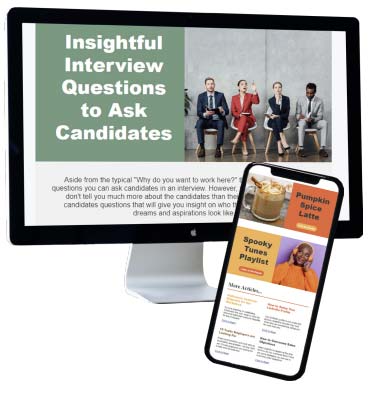Before You Go!
Sign up for our newsletter - which features professional templates, job market updates, articles, playlists, recipes, and more, sent directly to your inbox!


So you’ve got an interview date set, you’ve prepared all your answers to common interview questions and picked out the perfect interview attire. You’re thinking to yourself “I’m ready to go... Or am I?” What is it that you’re missing for your interview?
One of the most common mistakes people make when preparing for an interview is treating it like it will be an investigation where the employer will ask all the questions and you (the job seeker) will frantically try to find the right answers. Instead, interviews should be treated like a conversation. As the job seeker, this is also your opportunity to learn more about the company and position to find out if it’s the right match for you. This also shows the employer that you care about your potential new role and are interested in learning more. The following are some questions to ask an interviewer.
Greater focus on company culture is one of the top workplace trends in 2019. If the company you are looking to work for has an outdated or archaic view on company culture, then it might not be the company you are looking for. This question is important because it will give you insight on what kind of company they are and will show you how your own values do or don’t align with the company’s.
It’s always a good idea to have some kind of plan going into a new position. Knowing what will be expected of you is the best way to start preparing yourself for that first day of work.
Most job seekers aren’t just looking for a job to sit back in and remain stagnant in. Everyone goes into a new position hoping there will be new opportunities to learn and improve. Asking about the employer’s training programs will give you a clear idea of the amount you could grow while working for the company.
One of the best ways to find out the quality of life for employees is to ask your interviewer how long they have been with the company. This will give you a better idea of what it might be like for you to work there as well. Asking a question about the interviewer will also show that you are interested in them as a person, which is a great way to build rapport.
Growth and change happen for every company, what you want to look for is a company that is changing for the better. If the interviewer starts telling you how the company is “not what it used to be” or had a few recent hiccups, it’s important to know why. Knowing how the company has changed and why will show you what might happen if you were to work there.
If you happen to be one of those people who is always looking for a new way to improve yourself, you’ll most likely want to work for a company with an extensive performance review. Knowing the way the employer will review your performance will help give you a better idea of what part of the job is the most important to focus on.
Company culture is very important for many job seekers in 2019, but too often they forget to ask questions about the company culture in their interview. Knowing what kind of environment you will be working in will help give you an idea of what your day to day will look like.
While it’s important to know the good things about the position, it’s also important to be prepared for the more difficult aspects of the job. Knowing and being ready for the challenges will help keep you a step ahead.
This question will show the employer that you are invested in the job. If the interviewer has not already brought it up, it is important to know their expected timeline for the interviewing process so you will have an idea of when you might be notified for a second interview or potential offer.
Asking the right questions in an interview can help you not only learn more about the company, but also show the interviewer how invested you are in the job. There are so many different questions you can ask about the job, the interviewer, the company, and so on to help the Interview feel more like a conversation and less like an investigation. When you prepare for an interview, make sure you prepare questions to ask, so the next time an interviewer asks you “Do you have any questions?” you’ll be ready.
Ready for more smart questions to ask an interviewer? Click here for part 2.
